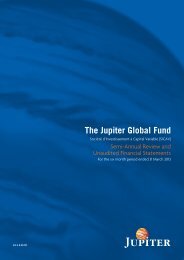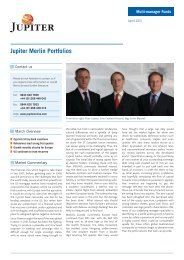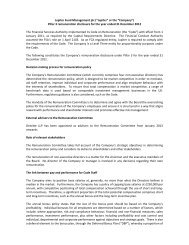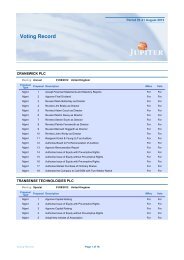Global Fund Prospectus - Jupiter Asset Management
Global Fund Prospectus - Jupiter Asset Management
Global Fund Prospectus - Jupiter Asset Management
- No tags were found...
Create successful ePaper yourself
Turn your PDF publications into a flip-book with our unique Google optimized e-Paper software.
THE JUPITER GLOBAL FUNDRisk Factors■■Risk FactorsParticipation NotesParticipation notes involve a particular contracting party risk in that thecontracting party may be unable to meet its payment obligations, ormay do so only partially or late. They also involve a market risk arisingfrom fluctuations in exchange rates and interest rates.In the case of participation notes which convert into foreign currency,there are also exchange rate opportunities and risks. Moreover, theseparticipation notes are subject to what is called a transfer risk,something which also exists with other participation notes involvingcross-border transactions.Possible Losses in Securities Option Transactions, FinancialFutures Contracts, Option Transactions on Financial FuturesContracts and Securities Index OptionsSecurities option dealings, financial futures contracts and optiondealings on financial futures contracts and securities index options(option rights and warrants) are all forward exchange transactions.However, since the possible profits arising from such transactions mustbe set against high possible losses, the investor must realise that:• the time-limited rights acquired from forward exchange transactionscan collapse or suffer a reduction in value;• the amount of the possible loss is not known in advance and canexceed any collateral provided;• it may not be possible, or may only be possible at a loss, to effectdealings through which the risks from forward exchange transactionswhich have been effected are to be excluded or limited; and• in addition to the above risks, the exercising of two linked forwardexchange transactions involves additional risks which depend onthe financial futures contracts/securities index options thus createdand may result in a loss far above the original investment in theprice paid for the option right or warrant.Currency Exposure and Passive Currency HedgingEach Class of each <strong>Fund</strong> will have its own Class Currency and each<strong>Fund</strong> will have its own Base Currency. The Shares of each Class willbe issued and redeemed by reference to the Class Currencyconcerned. The assets of each <strong>Fund</strong> may, however, be invested insecurities and other investments that are not denominated in its ClassCurrency and/or Base Currency. Accordingly, the value of such assetsmay be affected favourably or unfavourably by fluctuations in currencyrates and therefore each <strong>Fund</strong> will necessarily be subject to foreignexchange risks relative to its Class Currency and/or Base Currency.In particular, a Shareholder who acquires Shares of a <strong>Fund</strong> will besubject to foreign exchange risk in respect of those assets of that <strong>Fund</strong>which are denominated in any currency other than the currency ofinvestment in that <strong>Fund</strong> (irrespective of whether the currency ofinvestment was also the Class Currency and/or Base Currency).A Shareholder whose assets and liabilities are predominantly inanother currency should take into account the potential risk of loss (orgain) arising from fluctuations in value between the currencydenomination of the assets of a <strong>Fund</strong> in which the Shareholder investsand the Shareholder’s own currency of investment.A Shareholder who subscribes for Shares, or requests that redemptionpayments be made, in a currency other than the Base Currency of therelevant <strong>Fund</strong> should also take into account the potential risk of lossarising from fluctuations in value between the relevant Class Currencyand/or Base Currency and the currency that the Shareholder used tosubscribe for Shares or the currency in which the Shareholderrequests that redemption payments be made.Passive currency hedging strategies may be used by the InvestmentManager, at its sole discretion, to seek to reduce the impact of adversemovements between the Class Currency and/or Base Currency of a<strong>Fund</strong> and the currencies of the assets in which a <strong>Fund</strong> is invested.This may involve the use of foreign exchange transactions and/orcurrency derivatives. However, there is no guarantee that any hedgingtechniques will be employed or, if employed, that they will be effectivein managing the currency exposures to which a <strong>Fund</strong> may be subject.Each Class will be responsible for any currency hedging costsapplicable to the assets attributable to it.Exchange Rate Hedging TransactionsExchange rate hedging transactions serve to reduce exchange raterisks. As these hedging transactions only protect the Company to alimited extent to one part of the exchange rate losses, it cannot beruled out that exchange rate fluctuations can have a negative impacton the performance of the Company.Future Exchange TransactionsThe costs and possible losses arising in future exchange transactionsthrough the purchase of the corresponding option rights and warrantsreduce the operating profit of the Company. In this respect the notesregarding securities option transactions and financial futures contractsalso apply here.Lending SecuritiesThe loan of securities involves a particular contracting party risk in thatthe contracting party may be unable to (i) meet its payment obligations,or may do so only partially or late; and/or (ii) return the securities lentor to return them in time; and/or (iii) provide additional collateral whenso required. In the event that the borrowers of securities fail to fulfiltheir settlement obligations, the Company will suffer losses if theproceeds from realisation of the collateral possessed by the Companyare less than the value of the securities lent.Risk Reduction and Risk Avoidance MeasuresThe Investment Manager uses modern methods of analysis tooptimise the opportunity/risk ratio of an investment in securities.Through shifting and temporarily higher cash balances, the portion ofthe Company not invested in securities serves the objectives of theinvestment policy in that it reduces the effect of possible price falls insecurities investments. Nevertheless, no assurance can be given thatthe objectives of the investment policy will be reached.Emerging and Less Developed MarketsIn emerging and less developed markets, the legal, judicial andregulatory infrastructure is still developing but there is much legaluncertainty both for local market participants and their overseascounterparts. Some markets may carry higher risks for investors whoshould therefore ensure that, before investing, they understand therisks involved and are satisfied that an investment is suitable as partof their portfolio. Investments in emerging and less developed marketsshould be made only by sophisticated investors or professionals whohave independent knowledge of the relevant markets, are able toconsider and weigh the various risks presented by such investments,and have the financial resources necessary to bear the substantial riskof loss of investment in such investments.24








